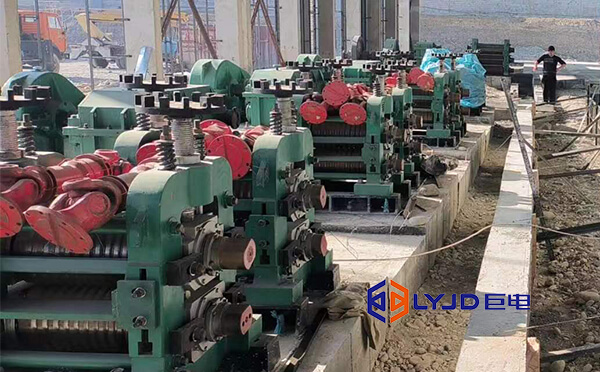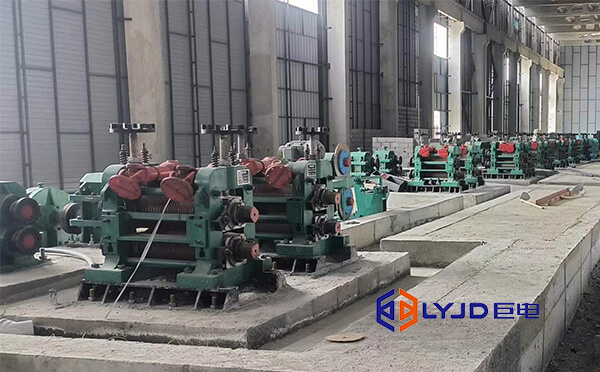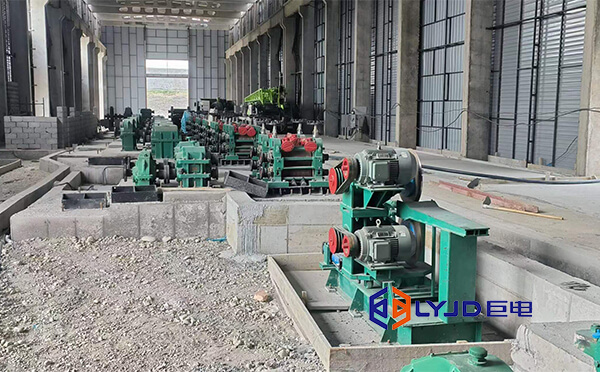The continuous rebar rolling mill is a mechanical equipment for producing steel bars. It consists of several stands arranged in a row according to the rolling direction. The rolling mills work on several stands simultaneously and maintain a continuous rolling relationship. Therefore, the metal flow rate per unit of time on each rolling mill must be equal.

The process involves multiple stands of rolling mills arranged in a tandem configuration, where the material passes through each stand successively, undergoing various stages of deformation and shaping. Here is a general overview of the work process of a continuous rolling mill.
The process starts with the preparation of raw materials, which typically include metal billets, ingots, or slabs. These raw materials are often heated to facilitate plastic deformation during the rolling process.
In some cases, the raw material may need to be reheated to a specific temperature to improve its plasticity and reduce the force required for rolling. This is particularly true for materials like steel.
The heated raw material is fed into the entry section of the rolling mill. This section usually consists of a manipulator or conveyor system that guides the material into the first stand of the mill.
The rolling mill is comprised of multiple rolling stands arranged in a tandem configuration. Each stand consists of a pair of rolls that rotate in opposite directions. The rolls apply pressure and deform the material as it passes between them.
The roll gap, which determines the thickness reduction of the material, is adjusted according to the desired final product specifications. This adjustment may be done manually or automatically using hydraulic or electronic systems.
As the material passes through each rolling stand, it undergoes plastic deformation, reducing its thickness and changing its shape. The number of stands and the degree of deformation depend on the desired final product.
Depending on the material and the rolling process, cooling systems may be employed to control the temperature of the rolled product. This helps to maintain the desired mechanical properties and dimensional accuracy.
After the last rolling stand, the material may undergo additional processes such as surface treatment, edge trimming, or cutting to achieve the final dimensions and surface quality required by the customer.
The final product is either coiled onto a reel or cut into specific lengths using shearing equipment. Coiling is common for products like sheets or strips while cutting is more typical for rods or bars.
Continuous steel bar rolling mills are widely used in the steel rolling industry. It mainly has the following advantages.

Since the continuous steel bar rolling mill can maintain a continuous rolling relationship, multiple stands can roll at the same time, greatly improving production efficiency.
During the continuous rolling process, the metal material undergoes a series of plastic deformations, resulting in more uniform deformation and finer grains, thereby improving the quality of the product.
There is micro-tension control between each frame of the continuous steel bar rolling mill, which can effectively reduce rolling energy consumption and save energy.
A continuous steel bar rolling mill can produce various specifications and types of steel bars to meet different market needs.
Each frame of the continuous steel bar rolling mill is relatively independent, making maintenance more convenient.
During the use of the continuous steel bar rolling mill, some problems will inevitably occur due to various reasons. So, what are the common faults?
During work, the steel bar rolling mill may make poor cuts, resulting in inaccurate steel bar lengths. At this time, the cut-to-length shears should be adjusted in time to ensure that the final steel bar length is accurate and consistent.
When processing steel bars, the steel bars may get stuck, causing the machine to be unable to continue working. In this case, it is necessary to suspend the entire steel bar production line, remove the stuck steel bars, and then restart the entire production line.
In autumn and winter, if the steel bar rolling mill is shut down for a long time, the steel bar rolling mill may be frozen, causing it to fail to work properly.
This may be the cause of the circuit failure of the steel bar rolling mill. If the motor is damaged, the machine will not function properly.
If the hydraulic system is damaged, it may cause the machine to not work properly. If the power source of the rolling mill is electricity, this situation will not exist.
If the fasteners of the steel bar rolling mill are loose or damaged, the rolling mill will vibrate or shift during operation. This kind of problem will lead to other derivative problems, ranging from the final product being unqualified to producing safety accidents at worst. Therefore, once this problem occurs in the rolling mill, it must be solved immediately.
Rebar rolling mills are susceptible to corrosion if left in a humid environment for a long time. Failure to maintain them for a long time may lead to machine failure. If the rollers are rusty, check whether they need to be replaced with new ones.
The continuous rebar rolling mill is a complex mechanical equipment. To ensure its long-term stable operation, regular maintenance and upkeep are crucial. The following are some recommended maintenance and upkeep measures.
Routine inspections should be conducted on various components of the steel bar rolling mill every day, including rolls, bearings, gears, chains, lubrication systems, hydraulic systems, etc. Check whether there are any abnormal phenomena such as oil leakage, water leakage, air leakage, etc., and whether various components are overheated.
More detailed inspection and maintenance of various components of the steel bar rolling mill should be carried out every week, including rolling mill operating procedures and operating methods, and gearbox maintenance. The gearbox should be cleaned at least once a quarter. Special attention should be paid to the safe operation of steel rolling equipment.
A detailed inspection and maintenance of all parts of the steel bar rolling mill should be carried out every month, including the lifting and lowering of the upper and lower rollers after the main drive of the motor is stopped. Cleaning should be carried out in a hot state.
After each production cycle, comprehensive maintenance should be carried out, including the cleaning of the rolling mill, inspection, and repair of all components, to ensure that the rolling mill can operate normally before the start of the next production cycle.
Maintenance files should be established to record equipment maintenance records, maintenance plans, equipment debugging, and other detailed information to help track the maintenance history of the equipment and find and solve problems promptly.
Professional maintenance personnel should be regularly arranged to inspect and repair the steel bar rolling mill to ensure that the equipment is always in good working condition.
During the maintenance and upkeep of the steel bar rolling mill, you must pay attention to safety to avoid accidental injuries caused by improper operation.

Steel bars are widely used in many industries. Therefore, the demand for continuous steel bar rolling mills for producing steel bars is also increasing day by day. Luoyang Judian is a manufacturer specializing in the production of continuous steel bar rolling mills. Welcome everyone to come to consult and purchase.
Please send us your request and we reply to you with in 24 hours.
Submit Request